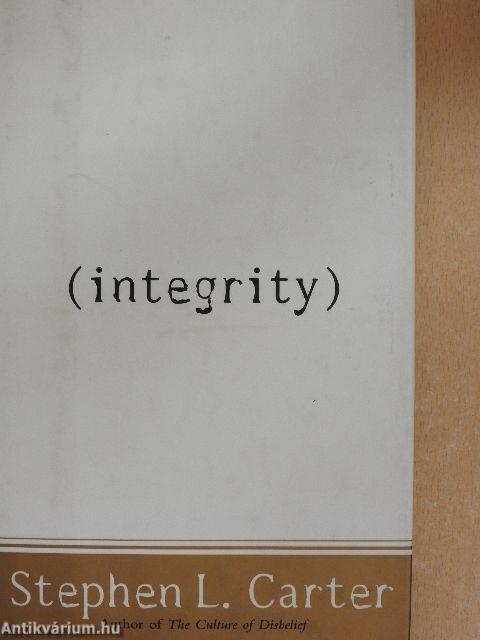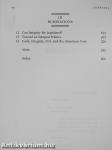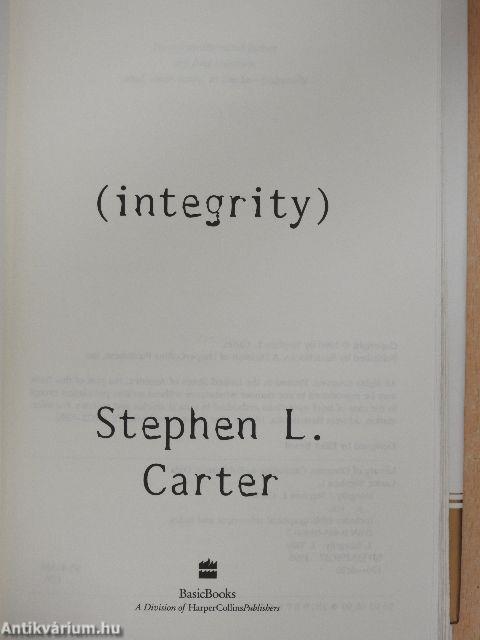1.118.325
kiadvánnyal nyújtjuk Magyarország legnagyobb antikvár könyv-kínálatát
Integrity
| Kiadó: | BasicBooks |
|---|---|
| Kiadás helye: | New York |
| Kiadás éve: | |
| Kötés típusa: | Fűzött kemény papírkötés |
| Oldalszám: | 277 oldal |
| Sorozatcím: | |
| Kötetszám: | |
| Nyelv: | Angol |
| Méret: | 24 cm x 15 cm |
| ISBN: | 0-465-03466-7 |
naponta értesítjük a beérkező friss
kiadványokról
naponta értesítjük a beérkező friss
kiadványokról
Előszó
TovábbFülszöveg
"I warmly recommend this timely and thought-provoking examination of the meaning of integrity and how we can build it into our own character and, by example, into our children's character. In fact, wouldn't it be wonderful if it became a cornerstone of our national life? What a difference it might make in our quality of life!"
—Marian Wright Edelman, President, The Children's Defense Fund
"Integrity—citizens rightly expect it of their leaders, who, in turn, promise it to their constituents. However, few pause to reflect on the meaning of integrity and its value in everyday life. In his book Intec?ritv. Stephen Carter takes the time to do just that—to explain that victory without integrity is short-lived and that the long-term health of our representative democracy requires citizenship and leadership that act upon what is right, rather than what is popular."
—Bill Bradley, United States Senator
"We need virtues. Here is a book that makes a strong, detailed, compelling case for... Tovább
Fülszöveg
"I warmly recommend this timely and thought-provoking examination of the meaning of integrity and how we can build it into our own character and, by example, into our children's character. In fact, wouldn't it be wonderful if it became a cornerstone of our national life? What a difference it might make in our quality of life!"
—Marian Wright Edelman, President, The Children's Defense Fund
"Integrity—citizens rightly expect it of their leaders, who, in turn, promise it to their constituents. However, few pause to reflect on the meaning of integrity and its value in everyday life. In his book Intec?ritv. Stephen Carter takes the time to do just that—to explain that victory without integrity is short-lived and that the long-term health of our representative democracy requires citizenship and leadership that act upon what is right, rather than what is popular."
—Bill Bradley, United States Senator
"We need virtues. Here is a book that makes a strong, detailed, compelling case for one core virtue. In doing so, it sets a model for others."
—Amitai Etzioni, University Professor, The George Washington University, and author of The Spirit of Community
"Stephen Carter's insightful mind and clear prose illuminate our failure to distinguish between the right to do something and the right thing to do. His book is a rare combination of intellectual and moral integrity." —Newton N. Minow, former chairman of the Federal Communications Commission and author of Abandoned in the Wasteland
"Stephen Carter has written a thorough, insightful, and provocative book about an essential virtue—integrity—that many Americans fear is diminishing in our personal lives, in our culture, and in our politics. He has reinvigorated a necessary conversation."
—Robert H. Bork, John M. Olin Scholar in Legal Studies, American Enterprise Institute for Public Policy Research
"To read Intecfrity is to feel that Stephen Carter has invited you into his mind to discuss with disarming candor those issues about which he agrees with you, those with which he disagrees. He doesn't argue; he tells you what he thinks and believes and why, then seems to listen carefully as you do the same. Had he nothing worth saying, the visit might simply be a reasonable pleasant way to pass the time. But if he had nothing worth saying, I wouldn't have stayed up all night listening and answering back." —John Cardinal O'Connor
1/1 11' H
1 I I : . ¦•!:
¦j . I
; \ I
I','.'
i ¦ ' i
ii'.
¦. I
' ¦ ¦ I
. 1 i
, t I - r . I
Ml' ¦ :
,1 I . : . I ' ¦ .
I ,
: ' ^ ' ¦ ;i i ) • l' i M '
I i . I ' I 1 ! - ¦ I I 'I 'ii ¦ ;
! M i I: , ^ 1 ' I I,; "
'Mi'V^ ¦ihvr:.
I i'.S' :
' , ' 1 i . ; " i
' I
I i , I 111 ,1 I ^
.t JI Ii
Integrity—all of us are in favor of it, but nobody seems to know how to make sure that we get it. From presidential candidates to crusading journalists to the lords of collegiate sports, everybody promises to deliver integrity, yet all too often, the promises go unfulfilled.
In this thoughtful book, Stephen Carter, whose 1993 book The Culture of Disbelief changed the way we talk about the role of religion in American life, turns his critical eye to the mystery of why the virtue of integrity holds such sway over the American political imagination. Why do we care more about winning than about playing by the rules? What are our rules about following the rules? What are our rules about breaking them? He explains why integrity is first in importance among the elements of good character, as well as why it is so hard to attain. By weaving together insights from philosophy, theology, history, and law, along with examples drawn from current events and a dose of personal experience, Carter offers a vision of integrity that has implications for everything from marriage and politics to professional football. He discusses the difficulties involved in trying to legislate integrity as well as the possibilities for teaching it. Vissza
Témakörök
- Történelem > Társadalomelmélet
- Filozófia > Témaköre szerint > Etika
- Idegennyelv > Idegennyelvű könyvek > Angol > Vallás > Kereszténység
- Idegennyelv > Idegennyelvű könyvek > Angol > Filozófia > Témaköre szerint > Etika
- Idegennyelv > Idegennyelvű könyvek > Angol > Történelem > Egyéb
- Vallás > Határtudományok > Filozófia
- Történelem > Idegennyelvű > Angol
- Történelem > Politika > Egyéb
- Filozófia > Témaköre szerint > Társadalomfilozófia > Egyéb
- Idegennyelv > Idegennyelvű könyvek > Angol > Filozófia > Témaköre szerint > Társadalomfilozófia > Egyéb
- Idegennyelv > Idegennyelvű könyvek > Angol > Vallás
- Vallás
- Vallás > Kereszténység > Teológia > Egyéb















